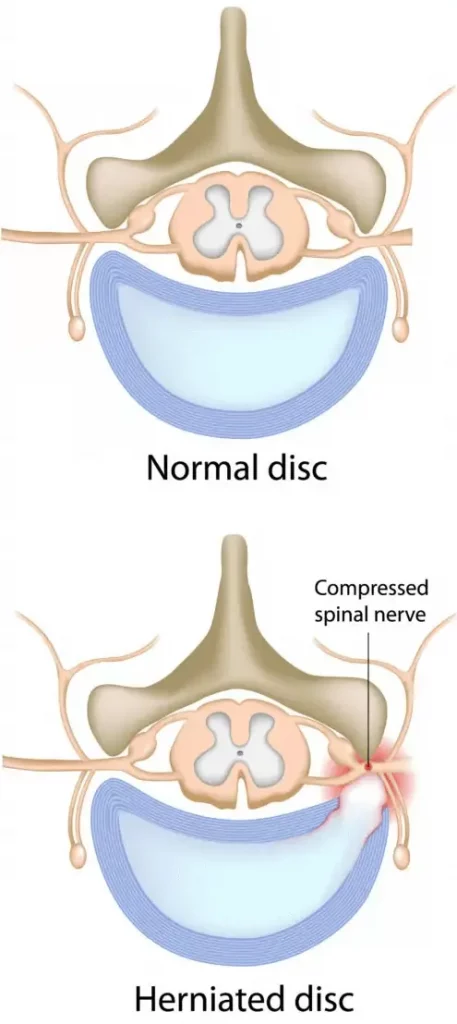A herniated disc, also known as a slipped or ruptured disc, is a medical condition that occurs when the soft center of a spinal disc protrudes through a tear in the tough outer layer. These discs act as cushions between the vertebrae in the spine, and a herniation can occur in any part of the spine but is most common in the lower back and neck regions.
Causes of Herniated Discs
Herniated discs are usually caused by wear and tear on the spine, although sudden pressure or trauma to the spine can also cause a disc to rupture. Some of the more common causes of herniated discs include:
- Aging – As we age, the discs in our spine can become less flexible and more prone to rupturing.
- Trauma – Trauma to the spine, such as a fall or car accident, can cause a disc to rupture.
- Repetitive Strain – Repetitive strain on the spine, such as heavy lifting or twisting, can cause the disc to weaken and eventually rupture.
- Genetics – Some people are more prone to herniated discs due to a genetic predisposition.
Symptoms and Problems from a Herniated Disc
The symptoms of a herniated disc can vary depending on the location of the disc and the severity of the herniation. Some common symptoms include:
- Back or neck pain – This can range from mild to severe and may be constant or intermittent.
- Numbness or tingling – This can occur in the arms, legs, or buttocks.

- Muscle weakness – This can make it difficult to perform everyday tasks, such as lifting objects or standing for long periods of time.
- Sciatica – This is a type of pain that radiates down the leg and is caused by pressure on the sciatic nerve.
- Loss of bladder or bowel control – In severe cases, a herniated disc can cause a loss of bladder or bowel control.
Treatment Options for Herniated Discs
There are several treatment options available for herniated discs, including:
- Rest and Physical Therapy – Rest and physical therapy can help reduce inflammation and relieve pain.
- Medications – Nonsteroidal anti-inflammatory drugs (NSAIDs) and pain medications can help alleviate pain.
- Corticosteroid Injections – Injections of corticosteroids can help reduce inflammation and pain.
- Surgery – In severe cases, surgery may be necessary to remove the herniated portion of the disc.
Typical Chiropractic Care for Herniated Discs
Chiropractic care provided by typical chiropractors is another treatment option for herniated discs. Chiropractors use a hands-on approach to manipulate the spine and help relieve pain and pressure on the affected area. Chiropractic care is extremely effective for herniated discs because it can reduce pain, increase range of motion, has minimal if any side-effects, can help heal herniated discs better, and is less expensive than most other options.
Chiropractic care for herniated discs typically involves a series of adjustments and other therapies, such as massage or physical therapy, to help reduce inflammation and restore mobility. Chiropractic care can also help prevent future herniated discs by improving spinal alignment and strengthening the muscles surrounding the spine.
In addition to pain relief, chiropractic care can also help improve overall health and well-being. Regular chiropractic adjustments can help improve joint mobility, reduce inflammation, improve overall function and help prevent future injuries. Chiropractors may also provide lifestyle advice such as exercise and nutrition to help patients maintain a healthy lifestyle.
Chiropractic Care Utilizing Zone Technique for Herniated Discs
Any Zone Technique healer, including Dr. Post, knows exactly what to do for any condition walking into the office, including any disc issue including herniated discs. Since Zone Technique is able to unlock and unleash the powerful healing ability withing your body, your healing results will be exceptionally better than any other healing technique available today. Whether you have or someone else you know has or might have one or more herniated discs, balancing the body by utilizing Zone Technique will heal your body on a very deep level. Zone Technique healing is natural, effective, and permanent so that you will heal completely, function great and no longer have pain. You can be totally healthy again – feeling great and functioning perfectly from head to toe every day of the year!
On top of this, Dr. Post was very fortunate to learn a specific and extremely effective disc treatment (NOT traction) that goes hand-in-hand with Zone Technique. When this treatment is performed, most patients realize pain relief on the same day. Exactly what most “disc patients” want and need – extremely fast pain relief.
If you don’t live close enough to see Dr. Post, search for a certified Zone Technique healer closer to you by searching the ZONE TECHNIQUE PRACTITIONER DIRECTORY. You owe it to yourself to take action so that you can heal and feel awesome again.
Conclusion
Herniated discs are a common and often painful condition that can be caused by a variety of factors. There are several treatment options available, including rest, medications, corticosteroid injections, surgery, and chiropractic care. Chiropractic care utilizing the Zone Technique is the safest and most effective option for treating herniated discs, and it can help not only reduce pain, improve range of motion, and speed up the healing process but you can fully heal so that your back feels perfect every single day of the year. If you are experiencing paint from what you might think is a herniated disc, chiropractic care is a perfect choice to help you heal in a safe, natural and more complete manner. Feel free to book an appointment for either a consultation or a chiropractic visit so that you can start feeling better today.

